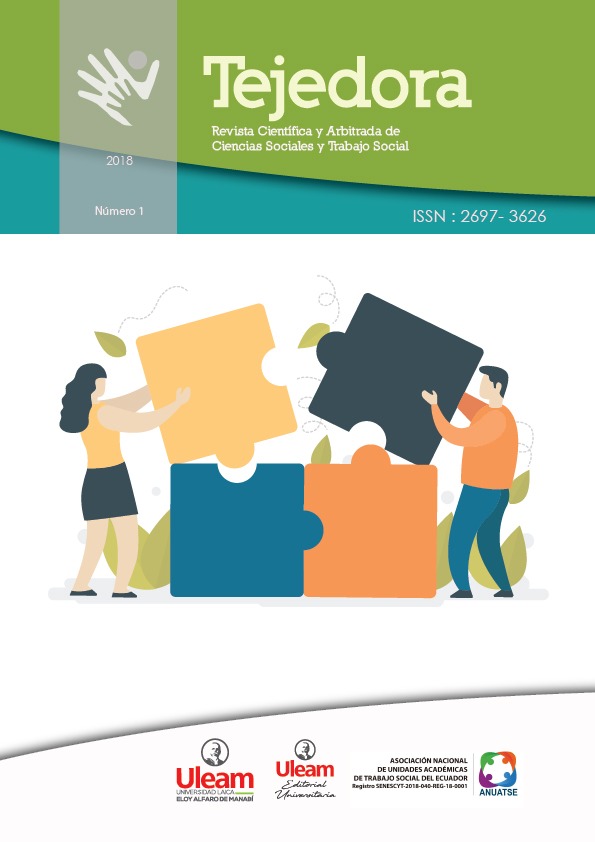LIÇÕES APRENDIDAS PARA O TRABALHO SOCIAL TRANSFORMADOR: GESTÃO TERRITORIAL VERNÁCULA - GUARDA INDÍGENA MEÑEBAI
DOI:
https://doi.org/10.56124/tj.v7i13.012Palavras-chave:
Intergeneracional, trabajo social crítico, pueblo indígena de reciente contacto, territorio vernáculo, extractivismoResumo
Durante 2022, a Guarda Indígena Meñebai, autoformada por decisão da assembleia geral da Organização Waorani de Pastaza para o autocuidado de seu território, realizou rondas de vigilância em áreas de maior ameaça e alerta territorial: caça ilegal, mineração ilegal, contaminação de águas, etc. Os Meñebai (língua Wao-terero) ou “como onças” se deixaram acompanhar por uma assistente social da Escola Intergeracional Wiñanani-Pikenani para compreender suas formas de gestão territorial vernacular, a partir de uma perspectiva crítica do trabalho social. Com base em trabalhos anteriores sobre relações sociais intergeracionais no território Waorani, foi utilizada a técnica dos Espaços de Convivência Cotidiana (ECC), que propõe um percurso para acompanhar processos territoriais de povos indígenas de recente contato. Entrevistas não estruturadas apoiaram a corroboração de informações. O resultado foi a identificação de características da gestão vernacular do território e suas formas de reprodução no exercício soberano de proteção do território Waorani de Pastaza, por meio das viagens de vigilância dos Meñebai. Essas lições aprendidas pretendem ser uma contribuição para o diálogo entre o trabalho social crítico e os territórios vernáculos, para que as propostas de ação nesses territórios respondam ao contexto e aos interesses daqueles que os compõem.
Downloads
Referências
Álvarez, Kati. 2018. “Las unidades de uso de suelos patrimoniales y modernos en los Tagaeri-taromenane y otras familias no contactadas: sugerencias para ampliar el área de protección y reducir el área de explotación petrolera”. Pp. 7–212 en Zona Intangible del Yasuní Entre el manejo territorial y la geografía imaginada. Quito: Abya - Yala.
Comisión Interamericana de Derechos Humanos. 2013. Pueblos indígenas en aislamiento voluntario y contacto inicial en Las Américas: recomendaciones para el pleno respeto a sus Derechos Humanos. Washington.
Duque, Gabriela Estefania. 2021. “Las relaciones sociales intergeneracionales de la nacionalidad Waorani y la reproducción de las lógicas de manejo territorial ancestral en el barrio waorani en Shell”. Universitat Politècnica de València, Valencia (Spain).
Duque Orozco, Gabriela Estefania, Paulina Elizabeth Oña Quillupangui, Marco Arturo Valladares Villagómez, y Alberto Muipa Boyotai Enomenga. 2023. “Contributions to Action Research for Transformation: Elderly-Teachers and Resistance Against the Systematic Territorial Dispossession”. Journal of Poverty 1–18.
Oña, Paulina, Marco Valladares, y Gabriela Duque. 2022. “El aprender–haciendo con enfoque intergeneracional: Un aprendizaje en libertad contado desde la Amazonía ecuatoriana”. Revista Internacional de Ciencias Sociales Interdisciplinares 10(2):135–43.
Rival, Laura. 2018. Transformaciones huaoranis: Frontera, cultura y tensión . 1a ed. Quito: Abya - Yala.
Yost, J., y P. Kelly. 1992. “Consideraciones culturales del terreno: el caso Huaorani”. Instituto Lingüístico de Verano
Publicado
Como Citar
Edição
Seção
Licença
Copyright (c) 2024 Revista Científica y Arbitrada de Ciencias Sociales y Trabajo Social: Tejedora. ISSN: 2697-3626

Este trabalho está licenciado sob uma licença Creative Commons Attribution-NonCommercial-ShareAlike 4.0 International License.






















